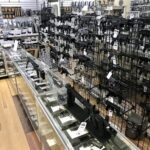Understanding The Importance Of Gun Safety
The importance of firearm safety cannot be overstated. In a world where firearms are prevalent, it is crucial for individuals to understand how to handle and store firearms safely to prevent accidents, injuries, and even fatalities. Whether you are a gun owner or someone who may come into contact with firearms at any point, having knowledge about firearm safety is paramount.
Firstly, understanding the basics of firearm safety helps promote responsible gun ownership. Guns should never be taken lightly; they require proper care and respect. A comprehensive understanding of safety measures ensures that owners are equipped to handle their firearms responsibly and minimize the risk of accidents occurring. Secondly, knowledge about firearm safety is essential for preventing unintentional injuries or deaths. Tragic incidents can occur when individuals mishandle guns due to ignorance or negligence.
By educating oneself about proper handling techniques, safe storage options, and how to prevent unauthorized access, one can significantly reduce the likelihood of such unfortunate events. Furthermore, awareness of firearm safety contributes to overall public safety. Even if you do not own a gun personally, there may be instances where you encounter firearms in various settings such as at friends’ houses or public places.
Understanding basic safety guidelines empowers individuals to handle these situations responsibly and mitigate potential risks. Lastly, promoting education on firearm safety helps reduce stigmatization surrounding firearms themselves.
What Is A Gun Safety Certificate?
What Is a Gun Safety Certificate? A firearm safety certificate is an official document that verifies an individual’s knowledge and understanding of safe handling and usage of firearms. It is typically required by law in many states or jurisdictions before an individual can purchase or possess a firearm. This certification process aims to ensure that firearms are only owned and operated by responsible individuals who are aware of the potential dangers associated with these weapons.
To obtain a firearm safety certificate, individuals must usually complete a comprehensive training course on firearm safety. These courses cover various topics such as proper handling, storage, transportation, and maintenance of firearms. Additionally, they educate participants about the legal responsibilities and obligations associated with owning or using firearms. The specific requirements for obtaining a firearm safety certificate may vary depending on the state or country where the certification is sought.
Some jurisdictions require applicants to pass a written examination that assesses their knowledge of firearm laws, safe handling practices, and emergency procedures. In other cases, individuals may need to demonstrate their practical skills through supervised shooting exercises. Gun safety certificates play a crucial role in promoting public safety by ensuring that gun owners possess the necessary knowledge to handle firearms responsibly.
By familiarizing themselves with basic safety protocols, gun owners can minimize accidents and prevent unauthorized access to their weapons. Moreover, these certifications serve as an important tool for law enforcement agencies to regulate firearms possession effectively.
The Process Of Obtaining A Gun Safety Certificate
Obtaining a Gun Safety Certificate (FSC) is a crucial step for individuals seeking to legally own or possess firearms in many jurisdictions. This certification ensures that gun owners are knowledgeable about the safe handling and operation of firearms, promoting responsible ownership and reducing the risks associated with gun-related accidents. The process to obtain an FSC involves several important steps that must be followed diligently.
Firstly, interested individuals must locate an authorized FSC provider in their area. These providers are typically licensed firearm dealers, certified instructors, or law enforcement agencies that offer the required safety training and administer the FSC test. It is essential to choose a reputable provider who adheres to all legal requirements and provides comprehensive instruction. Once enrolled in an FSC course, candidates receive training on various firearm safety topics such as proper storage, handling procedures, ammunition selection, and laws governing firearms possession and use.
The curriculum may also cover topics like basic marksmanship skills and safe shooting practices. Candidates should actively participate in the training sessions to gain a thorough understanding of these critical concepts. After completing the required training, candidates must pass a written examination administered by their chosen FSC provider. The test assesses their knowledge of firearm safety rules, laws related to firearms ownership and transportation, as well as basic firearm mechanics.
A passing score is usually required to obtain the certificate.
Why Is A Gun Safety Certificate Required?
Why is a Gun Safety Certificate Required? In many jurisdictions, obtaining a Gun Safety Certificate (FSC) is a mandatory requirement for individuals seeking to purchase or possess firearms. This certification process serves several crucial purposes aimed at ensuring public safety and responsible firearm ownership. The following factors contribute to the necessity of requiring a FSC:
1. Promoting Education and Knowledge: Requiring individuals to obtain an FSC encourages them to undergo comprehensive training on firearm safety, handling, and operation. By mandating this certification, authorities ensure that gun owners possess the necessary knowledge about safe handling practices, storage procedures, and potential risks associated with firearms. 2. Reducing Accidental Injuries and Deaths: Guns can pose significant risks if not handled properly.
Requiring an FSC helps reduce the likelihood of accidents by ensuring that gun owners are educated in basic safety principles. Proper training emphasizes key aspects such as muzzle awareness, trigger discipline, safe storage methods, and proper aiming techniques – all essential in preventing unintentional injuries or fatalities. 3. Preventing Unauthorized Access: Obtaining an FSC often involves undergoing background checks and meeting eligibility criteria set forth by law enforcement agencies or regulatory bodies.
These measures help prevent firearms from falling into the wrong hands by identifying individuals with criminal records or mental health issues that may jeopardize public safety. 4. Enforcing Responsible Ownership: Requiring an FSC reinforces responsible firearm ownership practices within society.
The Role Of Background Checks In Gun Safety Certification
In the realm of firearm safety certification, background checks play a crucial role in ensuring that individuals who obtain a firearm are responsible and pose no threat to themselves or others. A background check is a systematic review of an individual’s criminal, mental health, and other relevant records to determine their eligibility for owning or possessing firearms. This process acts as a vital screening mechanism that helps prevent potentially dangerous individuals from gaining access to firearms.
First and foremost, background checks aim to identify any criminal history that might disqualify an individual from obtaining a firearm. By examining arrest records, convictions, and restraining orders, authorities can identify individuals with violent tendencies or those involved in domestic abuse situations. This information is instrumental in preventing individuals with a history of violence from acquiring firearms legally. Moreover, mental health records also play a significant role in background checks for firearm safety certification.
Individuals with severe mental illnesses or those who have been involuntarily committed pose an increased risk when possessing firearms. By considering mental health records during the background check process, potential risks can be identified and appropriate measures taken to safeguard public safety. Another essential aspect of the background check process is verifying an individual’s legal status within the country. Immigration status plays a role in determining eligibility for firearm ownership, as non-citizens may face restrictions depending on their visa type or legal status.
Training And Education Requirements For Obtaining A Gun Safety Certificate
Obtaining a firearm safety certificate is a crucial step towards responsible gun ownership. To ensure that individuals possess the necessary knowledge and skills to handle firearms safely, various training and education requirements are enforced. These requirements aim to educate individuals about the potential risks associated with firearms, instill safe handling practices, and promote responsible gun ownership within the community. The training and education requirements for obtaining a firearm safety certificate typically involve both classroom instruction and hands-on experience.
Classroom sessions cover essential topics such as firearm laws, safe storage practices, basic shooting techniques, and proper maintenance procedures. Participants learn about the different types of firearms, their components, ammunition types, and how to identify potential hazards. They also gain an understanding of legal responsibilities related to gun ownership, including self-defense laws and restrictions on firearm possession. In addition to classroom instruction, practical training is an integral part of obtaining a firearm safety certificate.
This hands-on experience allows individuals to develop proficiency in handling firearms safely under supervised conditions. Participants learn proper loading and unloading techniques, how to aim accurately while maintaining control over their weapon, as well as strategies for mitigating potential accidents or malfunctions. To ensure consistency in training standards across jurisdictions, many states have designated certified instructors who conduct these courses. These instructors possess extensive knowledge of firearms laws and regulations while being skilled in imparting relevant information effectively.
Renewing And Maintaining Your Gun Safety Certificate
Obtaining a Gun Safety Certificate (FSC) is an essential step for anyone interested in owning or operating firearms responsibly. However, it is equally important to understand the process of renewing and maintaining your FSC to ensure ongoing compliance with safety regulations. In this subtopic, we will explore the necessary steps and guidelines for renewing your certificate, as well as some key aspects of maintaining your FSC.
Renewal of the FSC typically occurs every five years, depending on state-specific regulations. To renew your certificate, you must complete a renewal application before your current certification expires. These applications are usually available online or at authorized firearm dealerships and law enforcement agencies. The renewal process may involve submitting identification documents, completing a background check, and paying a renewal fee. Moreover, it is crucial to stay updated on any changes in firearm laws or safety regulations during the validity period of your FSC.
Familiarize yourself with local legislation and attend refresher courses or seminars organized by certified instructors. These educational opportunities can help reinforce safe handling practices, provide updates on legal requirements, and enhance overall awareness regarding firearms. Maintaining your FSC also involves responsible firearm storage practices. Ensure that you store firearms securely in locked cabinets or safes inaccessible to unauthorized individuals such as children or visitors.
Common Mistakes To Avoid During The Application Process
Applying for a firearm safety certificate is an important step towards responsible gun ownership. However, there are common mistakes that applicants often make during the application process. By being aware of these pitfalls and taking necessary precautions, you can ensure a smoother application experience. Here are some crucial mistakes to avoid:
1. Incomplete or inaccurate information: One of the most common mistakes is failing to provide complete and accurate information on the application form. Double-check all details such as personal information, contact details, and identification numbers before submitting your application. 2. Failure to meet eligibility requirements: It is essential to thoroughly review the eligibility criteria before applying for a firearm safety certificate.
Ensure you meet all the necessary age, residency, and legal requirements set by your jurisdiction. 3. Lack of proper documentation: Many applicants overlook the importance of providing supporting documents along with their application. These may include proof of identification, residency, training certificates, or any other required documentation specified by your local authorities. 4. Neglecting background check requirements: Background checks are a crucial part of the firearm safety certificate application process in many jurisdictions.
Failing to disclose relevant criminal history or providing false information can lead to serious legal consequences. 5. Missed deadlines or incomplete applications: Stay informed about any deadlines associated with your application process and submit it well within time. Incomplete applications may cause unnecessary delays or even rejection. 6.
How Does A Gun Safety Certificate Impact Gun Ownership?
How Does a Gun Safety Certificate Impact Gun Ownership? A firearm safety certificate plays a crucial role in ensuring responsible and safe gun ownership. This certification process assesses an individual’s knowledge and understanding of firearms, their safe handling, storage, and the laws surrounding their use. By obtaining a firearm safety certificate, individuals demonstrate their commitment to responsible gun ownership and contribute to the overall safety of themselves and others.
Firstly, a firearm safety certificate serves as evidence that an individual has undergone proper training on the safe handling and operation of firearms. This certification typically involves completing a comprehensive course that covers topics such as firearm laws, basic firearm mechanics, shooting techniques, and storage requirements. By acquiring this knowledge through the certification process, gun owners are better equipped to handle firearms safely and responsibly.
Furthermore, requiring a firearm safety certificate before purchasing or owning a gun helps prevent accidents or misuse due to ignorance or negligence. The training involved in obtaining this certificate ensures that individuals understand the potential dangers associated with firearms and how to mitigate them effectively. It emphasizes responsible practices such as proper storage procedures to prevent unauthorized access by children or unauthorized users.
Moreover, having a standardized certification process allows law enforcement agencies to quickly verify if an individual is legally qualified to own firearms. This aids in streamlining background checks during gun purchases or transfers. It also helps authorities identify potential risks by flagging individuals who may have had their certificates revoked due to criminal activity or other disqualifying factors.
Enhancing Public Safety Through Effective Gun Certification Programs
Gun safety is a paramount concern for any society, and the implementation of effective firearm certification programs plays a crucial role in enhancing public safety. These programs aim to ensure that individuals who possess firearms are knowledgeable about their safe handling, storage, and usage. By promoting responsible gun ownership, these certification programs contribute to reducing accidents, preventing unauthorized access to firearms, and curbing illegal activities involving firearms.
One key aspect of an effective firearm certification program is comprehensive training. This includes educating individuals on the fundamental principles of firearm safety, such as proper storage techniques to prevent unauthorized access by children or unauthorized users. It also emphasizes responsible handling practices and teaches individuals how to mitigate potential risks associated with firearms. Furthermore, an effective certification program should incorporate thorough background checks on applicants.
This helps identify individuals with criminal records or mental health issues that may pose a threat to public safety if granted access to firearms. By ensuring that only law-abiding citizens who meet specific criteria can obtain firearm certifications, these programs contribute significantly to preventing potentially dangerous individuals from acquiring guns. Regular recertification is another essential component of an effective firearm certification program.
As technology evolves and new safety measures emerge, it is vital for certified individuals to stay updated on the latest developments in firearm safety practices. Recertification ensures that knowledge remains current while reinforcing safe habits and behaviors.
Related



























